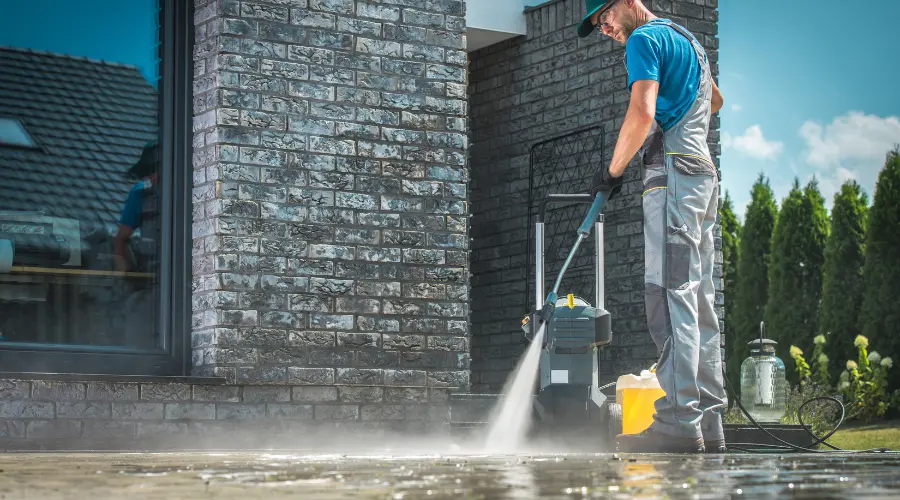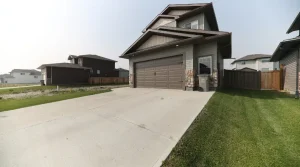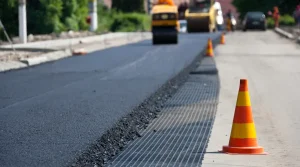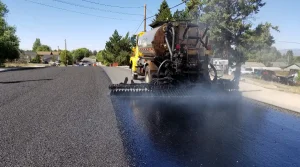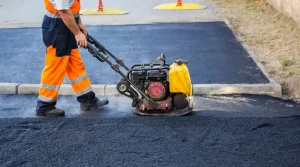Commercial paving surfaces are critical to any business property, serving as the first impression for customers and visitors. Proper maintenance ensures these surfaces remain safe, durable, and eye-catching, adding to the overall success of your business.
Key Takeaway:
- Regular maintenance of commercial paving surfaces is essential for enhancing safety, extending the pavement’s lifespan, improving aesthetics, and reducing long-term costs.
- Proactive care preserves the investment, ensures functionality, and creates a professional image.
What is the Purpose of Commercial Paving Maintenance?
Commercial paving is essential for safeguarding its condition, appearance, and functionality. Parking lots, driveways, and pathways are surfaces that are subject to continuous face constant challenges, including:
- Environmental Factors: UV rays, rain, snow, and temperature fluctuations.
- Heavy Usage: Foot traffic, vehicular pressure, and potential chemical spills.
Key maintenance activities address these challenges effectively:
- Crack Sealing: Prevents water infiltration and structural damage by filling and sealing cracks promptly.
- Sealcoating: Adds a protective layer that shields the pavement from harmful elements, extending its lifespan.
- Pothole Repairs: Ensures smooth surfaces and prevents accidents caused by uneven pavement.
- Regular Cleaning: Removes debris, stains, and contaminants to maintain a professional appearance and prevent long-term surface damage.
By addressing wear and tear proactively, businesses can save small problems from becoming more serious and requiring expensive repairs.or replacements.
What is the Useful Life of Commercial Paving?
The longevity of commercial paving depends on several factors, including material type, usage, and climate conditions. Here’s an overview:
- Asphalt Pavements typically last 15 to 20 years with consistent maintenance.
- Concrete Pavements: Can endure 30 years or more with proper care.
Frequent upkeep is essential for prolonging these lifespans. Neglected pavements deteriorate faster due to cracks, potholes, and other structural issues, compromising functionality and appearance.
Top Benefits of Regular Maintenance for Commercial Paving
1. Preventing Deterioration
Weather exposure can cause fading, cracking, and surface erosion. Regular upkeep, such crack sealing and seal coating, creates a barrier against harmful UV rays, moisture, and chemicals, preserving the pavement’s structural integrity.
2. Enhancing Safety
Safety hazards like cracks, potholes, and uneven surfaces pose risks to pedestrians and vehicles. Addressing these issues promptly minimizes accidents and ensures compliance with safety standards. Regular maintenance helps create a safer environment for employees, customers, and visitors.
3. Extending Lifespan
Proactive care keeps minor problems from becoming more serious. significant problems, significantly extending the lifespan of commercial pavements. For instance, a well-maintained asphalt parking lot can reach its maximum lifespan of 20 years or more.
4. Reducing Long-Term Costs
While routine maintenance requires an upfront investment, it’s far more economical than extensive repairs or complete replacements. Preventive measures such as sealing and cleaning can save businesses thousands of dollars in the long run.
5. Improving Aesthetic Appeal
Well-maintained paving surfaces enhance the overall appearance of your property. Clean, polished, and damage-free pavements leave a positive impression on customers, reinforcing your business’s professionalism and commitment to quality.
How Proper Maintenance Saves Money
Regular maintenance minimizes the likelihood of significant repairs, protecting your investment and reducing liability risks. Here’s how:
- Preventing Expensive Repairs: Timely crack sealing and pothole repairs prevent more significant structural issues that require costly interventions.
- Avoiding Legal Liabilities: Maintaining safe, hazard-free surfaces reduces the risk of accidents and potential lawsuits.
- Maximizing Material Lifespan: Proper care ensures that asphalt and concrete surfaces reach their full potential, delaying costly replacements.
FAQ: Commercial Paving Maintenance
Q: How often should commercial paving be inspected?
A: Inspections should occur preferably in the spring and autumn, but at least twice a year, to recognize and address damage caused by seasonal changes.
Q: What is seal coating, and why is it important?
A: Sealcoating involves applying a protective layer to asphalt surfaces, shielding them from UV rays, water, and chemicals. It enhances durability and prolongs the pavement’s lifespan.
Q: Can small cracks be ignored?
A: No. Small cracks can quickly expand due to water infiltration and temperature changes, leading to significant damage. Addressing them promptly saves money in the long term.
Q: How can I improve the appearance of my commercial paving?
A: Regular cleaning, crack filling, seal coating, and timely repairs keep surfaces looking clean and professional.
Q: What’s the cost of neglecting maintenance?
A: Neglect can lead to accelerated deterioration, higher repair costs, safety hazards, and a negative impression on customers.
Q: Can maintenance be done during business hours?
A: Yes. Many paving contractors offer flexible scheduling to minimize disruptions to your operations.
Conclusion
Regular maintenance of commercial paving surfaces is a critical investment that delivers lasting benefits. By enhancing safety, extending lifespan, and improving curb appeal, businesses can ensure their pavements remain functional and visually appealing for years. Proactive care also reduces long-term costs and positively reflects on your brand. Don’t wait for issues to escalate—prioritize routine maintenance and safeguard your paving investment today.
For expert advice and professional services, visit pavinghackensack.com.

